25th December. Birth of the JESUS and Quad-e-Azam.
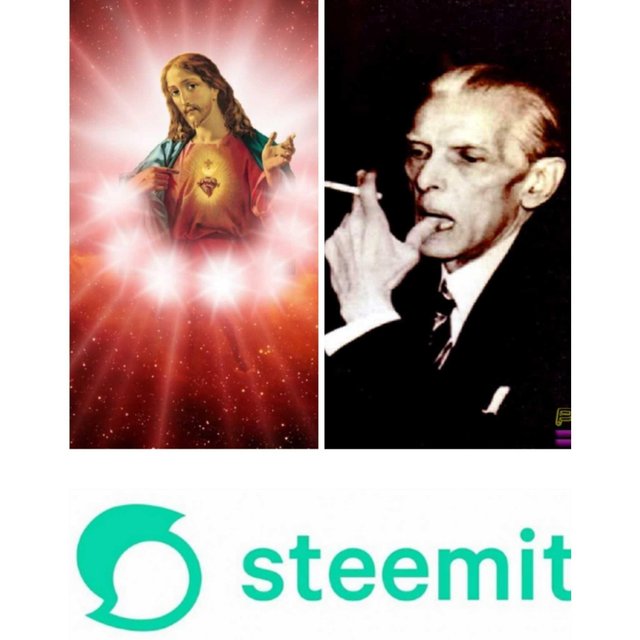
Birth of Jesus: (Islamic belief)

Many times in the year while Christians celebrate their religious occasions like Christmas, Easter and Thanksgiving, Muslim parents might face some questions raised by their children about Christianity and Jesus Christ.
These occasions are the best time for Muslim parents to educate their children about other faiths and how Muslims respect other people’s beliefs.
It’s necessary to educate our children about other religions and tell them stories of other prophets as narrated in the Qur’an.
Inform your child that Christmas comes from the word Christ used to call Jesus Christ. The “Mass” is a religious ceremony. Christ means “the Messiah” or “messenger” of God. It is an honorific title.
Jesus is known in Arabic as Isa (peace be upon him) as mentioned in the Qur’an.
Muslims have an utmost respect for Prophet Jesus (peace be upon him). Every time Muslims mention the name Jesus, they add “Peace be upon him. In the Qur’an, the name of Prophet Jesus is mentioned five times more than the name of Prophet Muhammad.
Impress upon your child that Prophet Jesus (peace be upon him) is important in both Islam and Christianity. However, there are major differences in what we believe happened to him.
Read the passages in the Qur’an pertaining to Jesus (peace be upon him) and his mother, Mary. Go to the third chapter of the Qur’an called “The Family Of Imran” and also go to the nineteenth chapter of the Qur’an called “Maryam.”
The Qur’an, like the Bible, confirms that Jesus (peace be upon him) was born from a mother but not from a father. It confirms that Jesus’ birth was miraculous.
“(Remember) when the angels said, “O Mary, God gives you good news of a word from Him (God), whose name is the Messiah Jesus, son of Mary, revered in this world and the Hereafter, and one of those brought near (to God). He will speak to the people from his cradle and as a man, and he is of the righteous.” She said, “My Lord, how can I have a child when no mortal has touched me?” He said, “So (it will be). God creates what He wills. If He decrees a thing, He says to it only, ‘Be!’ and it is.”” (The Qur’an, 3:45-47)
However, Muslims believe Jesus (peace be upon him) was able to speak when he was a baby in order to defend his mother against the neighbors’ accusations and in order to preach. Christians, on the other end, believe Jesus started preaching when he was thirty years old.
“Then she (Mary) pointed to him. They said: ‘How can we talk to one who is a child in the cradle?’ He (Jesus) said: ‘Verily! I am a slave of God, He has given me the Scripture and made me a Prophet.” (The Qur’an, 19:29-30).
Because of his miraculous birth, Christians believe Jesus is the son of God. Muslims believe he (peace be upon him) is only a prophet.
“Such was Jesus, the son of Mary; it is a statement of truth, about which they vainly dispute. It is not befitting to the majesty of God, that He should beget a son. Glory be to Him! When He determines a matter, He only says to it, ‘Be’ and it is” (The Qur’an 19:34-35).
Both Christians and Muslims believe Jesus (peace be upon him) performed many miracles during his life. The Qur’an says that he (peace be upon him) healed the blind and the leper and was also able to raise the dead with the help of Allah.
“I have come to you with a sign from your Lord. I make for you the shape of a bird out of clay, I breathe into it, and it becomes a bird by God’s permission. I heal the blind from birth and the leper. And I bring the dead to life by God’s permission. And I tell you what you eat and what you store in your houses….” (The Qur’an, 3:49)
The Bible agrees with the Qur’an on the miracles, but does not mention that Jesus spoke in his cradle, neither does the Bible mention Jesus could breathe life into a bird made of clay.
Christians believe Jesus was martyred on the cross to atone people’s sins (Bible Romans 4:25). Muslims think a person who looked alike Jesus (peace be upon him) was put on the cross. Muslims also believe nobody can be responsible for another person’s sins.
“They did not kill him, nor did they crucify him, but they thought they did.” (The Qur’an 4:156).
Birth of Muhammad Ali Jinnah
(Quad-e-Azam):
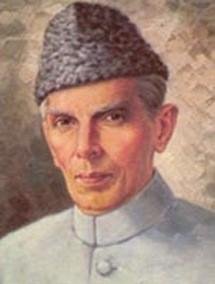
Who is Jinnah?
Muhammad Ali Jinnah (born Mahomedali Jinnahbhai; 25 December 1876 – 11 September 1948) was a lawyer, politician and the founder of Pakistan. Jinnah served as leader of the All-India Muslim League from 1913 until Pakistan's independence on 14 August 1947, and then as Pakistan's first Governor-General until his death. He is revered in Pakistan as Quaid-i-Azam (Urdu: قائد اعظم; Great Leader) and Baba-i-Qaum (Urdu: بابائے قوم; Father of the Nation). His birthday is considered as a national holiday in Pakistan.
Quaid-e-Azam, Muhammad Ali Jinnah was born on 25th December 1876 at Vazeer Mansion Karachi, was the first of seven children of Jinnahbhai, a prosperous merchant. After being taught at home, Jinnah was sent to the Sindh Madrasasah High School in 1887. Later he attended the Mission High School, where, at the age of 16, he passed the matriculation examination of the University of Bombay. On the advice of an English friend, his father decided to send him to England to acquire business experience. Jinnah, however, had made up his mind to become a barrister. In keeping with the custom of the time, his parents arranged for an early marriage for him before he left for England.
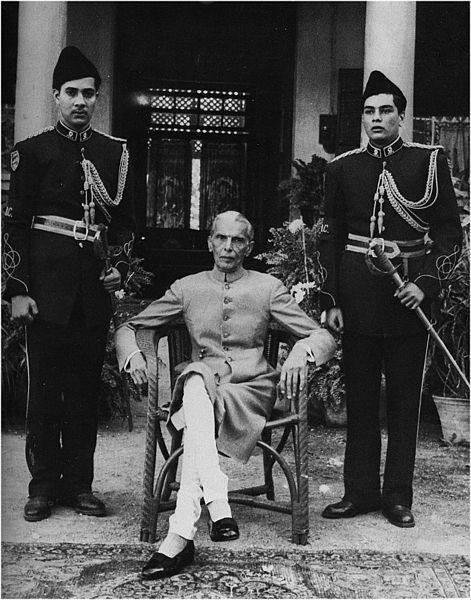
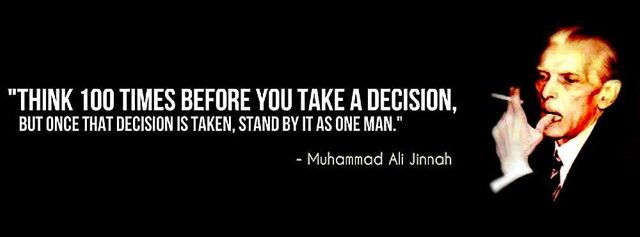
In London he joined Lincoln’s Inn, one of the legal societies that prepared students for the bar. In 1895, at the age of 19, he was called to the bar. While in London Jinnah suffered two severe bereavements–the deaths of his wife and his mother. Nevertheless, he completed his formal studies and also made a study of the British political system, frequently visiting the House of Commons. He was greatly influenced by the liberalism of William E. Gladstone, who had become prime minister for the fourth time in 1892, the year of Jinnah’s arrival in London. Jinnah also took a keen interest in the affairs of India and in Indian students. When the Parsi leader Dadabhai Naoroji, a leading Indian nationalist, ran for the English Parliament, Jinnah and other Indian students worked day and night for him. Their efforts were crowned with success, and Naoroji became the first Indian to sit in the House of Commons.
Poonja Jinnah (Father of Quaid-e-Azam Muhammad Ali Jinnah
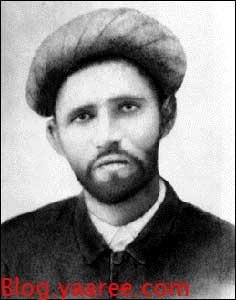
When Jinnah returned to Karachi in 1896, he found that his father’s business had suffered losses and that he now had to depend on himself. He decided to start his legal practice in Bombay, but it took him years of work to establish himself as a lawyer.
Jinnah first entered politics by participating in the 1906 Calcutta session of the Indian National Congress, the party that called for dominion status and later for independence for India. Four years later he was elected to the Imperial Legislative Council–the beginning of a long and distinguished parliamentary career. In Bombay he came to know, among other important Congress personalities, Gopal Krishna Gokhale, the eminent Maratha leader. Greatly influenced by these nationalist politicians, Jinnah aspired during the early part of his political life to become “a Muslim Gokhale.” Admiration for British political institutions and an eagerness to raise the status of India in the international community and to develop a sense of Indian nationhood among the peoples of India were the chief elements of his politics. At that time, he still looked upon Muslim interests in the context of Indian nationalism.
Jinnah had originally been dubious about the practicability of Pakistan, an idea that Sir Muhammad Iqbal had propounded to the Muslim League conference of 1930; but before long he became convinced that a Muslim homeland on the Indian subcontinent was the only way of safeguarding Muslim interests and the Muslim way of life. It was not religious persecution that he feared so much as the future exclusion of Muslims from all prospects of advancement within India as soon as power became vested in the close-knit structure of Hindu social organisation. To guard against this danger he carried on a nation-wide campaign to warn his coreligionists of the perils of their position, and he converted the Muslim League into a powerful instrument for unifying the Muslims into a nation.
Muhammad Ali Jinnah, addressing a procession on 23rd March, 1940
At this point, Jinnah emerged as the leader of a renascent Muslim nation. Events began to move fast. On March 22-23, 1940, in Lahore, the league adopted a resolution to form a separate Muslim state, Pakistan. The Pakistan idea was first ridiculed and then tenaciously opposed by the Congress. But it captured the imagination of the Muslims. Pitted against Jinnah were men of the stature of Gandhi and Jawaharlal Nehru. And the British government seemed to be intent on maintaining the political unity of the Indian subcontinent. But Jinnah led his movement with such skill and tenacity that ultimately both the Congress and the British government had no option but to agree to the partitioning of India. Pakistan thus emerged as an independent state in 14th August, 1947.
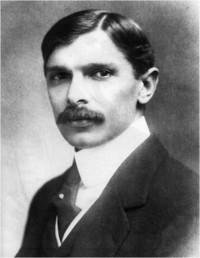
 )
)
 )
)
 )
)
Jinnah became the first head of the new state i.e. Pakistan. He took oath as the first governor general on August 15, 1947. Faced with the serious problems of a young nation, he tackled Pakistan’s problems with authority. He was not regarded as merely the governor-general; he was revered as the father of the nation. He worked hard until overpowered by age and disease in Karachi. He died on 11th September, 1948 at Karachi.
If you don't want to miss any thing from my side OR if you like this blog and expect more good stuff, definitely show up to my page and I guarantee that you will like my other blogs entertaining and informative too. This is the link to my steemit page: https://steemit.com/@liaquatkhan
welcome to steemit @liaquatkhan, best regards..
hopefully you feel at home here. 😊
Thank you bro, following you